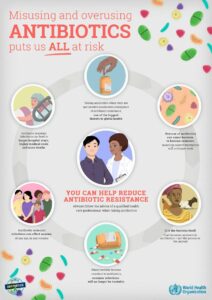Does my child need antibiotics?
Antibiotics: Needed or Not?
Now that cold and flu season is in full swing, I’d like to take a moment to talk about antibiotics and when they should or shouldn’t be used. As most of you are probably aware, cold and flu season brings loads of infections into every family’s household, especially if you have a young child in school or daycare. What you may not be aware of, however, is that the majority of illnesses are viral, and will not improve with the use of antibiotics. In fact, antibiotic overuse is a significant problem, causing a rise in resistant strains of bacteria across the world and unnecessary side effects suffered by your children.
Some of the most common viral illnesses your family may encounter are:
- the common cold
- pharyngitis (sore throat)
- influenza
- COVID
- RSV
- Mononucleosis
- Hand, foot and mouth disease
- viral pneumonia
- gastroenteritis (vomiting and diarrhea)
- viral conjunctivitis
- and many more
All colds are caused by viruses. There are hundreds of strains of cold viruses, so sometimes your children may suffer from one after another during a cold and flu season. In fact, it is normal for your child to have 12 or more colds per year. Viruses are typically very contagious, and most develop 1-3 days following contact with another person who has been ill.
Typical viral symptoms may include:
- fever
- nasal congestion
- runny nose
- cough
- sore throat
- body aches
- mild headache
- fatigue
- vomiting for 24 hours or less
- diarrhea
- rash
Viral illnesses do not require antibiotics, but rather time and the body’s own natural defenses in order to get better. Viral infections are at least improving within 7-10 days, but some symptoms may persist for up to 3 weeks. We will often recommend supportive care including: rest, hydration, proper nutrition, and occasionally, over the counter medications.
Bacterial infections your family may encounter include:
- strep throat
- ear infection
- urinary tract infection
- impetigo
- bacterial pneumonia
- bacterial sinusitis
- bacterial meningitis
- Cellulitis/abscesses
- bacterial conjunctivitis
Symptoms of a bacterial infections may include:
- sudden onset of high fever
- fever lasting more than 72 hours without any obvious viral symptoms
- ill-appearing child
- severe headache
- sore throat without any other cold symptoms
- significant fatigue
- cold symptoms that are worsening after a week or not improving at all after 10 days
- painful urination, urgency, frequent urination, urinary incontinence
- persistent ear pain
- severe rash or skin redness/swelling
Bacterial infections will often times require antibiotics in order to improve, however this is not always the case. Ear infections, for example, may improve on their own without any intervention, typically within 48-72 hours, so even if your child has an ear infection, we may not choose to treat right away. If your child is prescribed an antibiotic for a bacterial infection, it is important to finish the medication as prescribed, and if there is any left over, please do NOT keep it. Discard the remaining antibiotics (call your pharmacy to find out how) and never use another child’s antibiotics for your other children without talking to a provider first. Antibiotics are often weight-based and if the proper dose is not given, this may contribute to antibiotic resistance.

You may not always be able to distinguish between a viral and bacterial infection in your child, so it is important for you to know that we have advice line nurses to help you figure out if your child requires an appointment. We are always happy to see your children in the office so they are properly diagnosed and treated.

